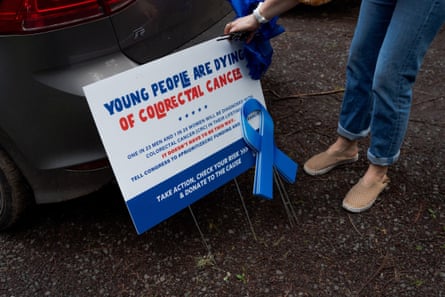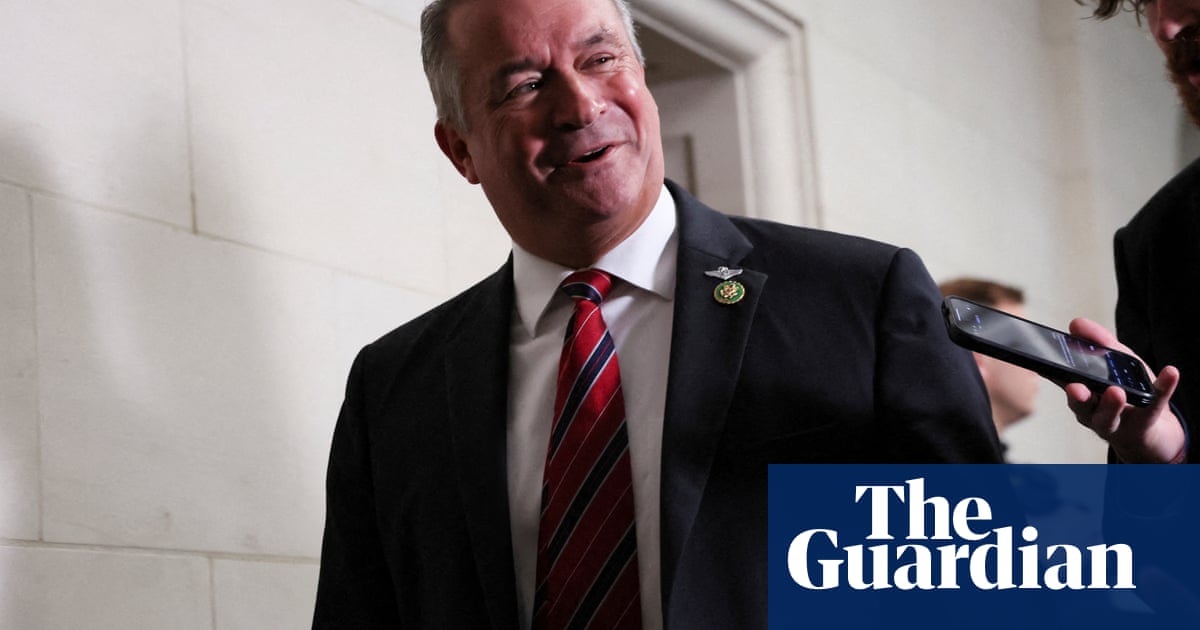A 43-year-old woman and mother of two with advanced cancer is experiencing life-or-death delays in treatment because of the Trump administration’s cuts to the National Institutes of Health.
Natalie Phelps, who has stage 4 colorectal cancer, has spoken publicly, raising the alarm about a setback in care for herself and others who are part of clinical trials run by the agency. Her story has made it into congressional hearings and spurred a spat between a Democratic senator and health secretary Robert F Kennedy Jr. Behind the scenes, she and others are advocating to get her treatment started sooner.
So far, Phelps has been told that her treatment, which should have started around mid-June, will not begin until after mid-July.
“I’ve done everything I can do,” Phelps, who lives in Washington state, told the Guardian. “There’s nothing else I can do. I’m really just out of options. There’s very limited treatments approved for colorectal cancer.”
Phelps is one of many Americans whose lives have been disrupted or altered by the ongoing cuts to government services made by the Trump administration’s so-called “department of government efficiency” or Doge. NIH scientists have lost their jobs, and some have seen their grants ended. Researchers told the Associated Press that cuts to the agency and its programs would end treatment for cancer patients and delay cures and treatment discoveries.

Phelps was diagnosed in 2020, soon after giving birth to her second child, and after her symptoms were dismissed by doctors for months. Since then, she’s done 48 rounds of chemotherapy. She had an 18-hour surgery to remove her primary tumor, plus two follow-up liver surgeries. She’s had radiation to her brain, leg and pelvis.
Dr Steven Rosenberg’s cell-based immunotherapy trial at the National Institutes of Health offered hope. The treatment uses a person’s own cells to fight cancer and has seen some promise for patients with colon, rectal and GI cancers. This was deemed an exciting step by the medical community because the process had previously worked on blood cancers, but not solid cancers, the Washington Post reported.
But these promising developments are coming alongside cuts to federal agencies, including ones that have affected these trials, Rosenberg has publicly confirmed. The trial itself was not cut, but it is experiencing delays because of staff reductions.
Phelps passed the initial medical steps to enter the trial in March, then flew to Bethesda, Maryland, at the end of April this year. There, they drew her blood to use to engineer T-cells for her treatment, which she previously was told takes about four weeks. Instead, she was told it would now take eight weeks, which the doctors told her was because of funding cuts from Doge.
“That got me motivated enough to start to really panic, because my cancer between March and April really exploded and progressed to my lymph nodes and my bones,” she said. “My oncologist was very anxious about the difference between four and eight weeks could make, waiting for those treatment products.”
One month can make a huge difference in late-stage cancer treatment, but the delay also brought up major decisions for Phelps. She wouldn’t be able to do chemo for a month before the treatment began. With a delay, she could maybe do chemo for a bit, then stop a month before.
Then there was the size of her tumors – which would become the subject of the spat in a congressional hearing. She needed a tumor of at least one centimeter in size to start the trial, or an exemption – her disease was spreading in the number of tumors, not in one large tumor. The tumor would help scientists track how the treatment was working.

If she did chemo before doing a final scan needed to start the trial, tumors could shrink, affecting her eligibility. But if she waited for two months and did nothing, the disease could keep spreading. Her oncologist thought maybe the trial would have to go on the back burner, given the extended timeline.
Phelps posted on social media, explaining her predicament. After seeing her videos, friends suggested she reach out to her members of Congress, who could intervene with the agency and help her get treated sooner.
The office of Pat Murray, a Washington Democratic senator, got involved. On 14 May, Murray questioned Kennedy during a Senate health, education, labor and pensions committee hearing, sharing Phelps’ story and asking how many staff have been cut from the NIH’s clinical center. Kennedy said to reach out to his office for specifics on Phelps and claimed no cuts had been made to clinical trials. “I don’t think that should happen to anybody,” he said.
Later in the hearing, though, Kennedy said his office had looked into the case and claimed that Phelps was “medically ineligible” for the trial, so her case had nothing to do with staff reductions. “That was a canard,” he told the committee, and he told Murray: “You don’t care. You don’t care about Natalie.” The exchange became a Fox News headline.
It was a “spurious statement” to say she was medically ineligible, Phelps said – she was waiting for one final scan to see if her tumor was one centimeter, but had met all other criteria. She had a scan the day after the hearing, which showed her tumor had now grown large enough to qualify.
“It’s been so much extra stress. The night after the hearing, I threw up all night. I barely made it to my scan because I was so stressed out,” she said. “It’s been very intense emotionally and an extreme added stress that nobody needs. Cancer just shouldn’t be political.”
In a Senate appropriations hearing the next week, Kennedy again argued with Murray, saying it was “untrue” that Phelps’ care was delayed. In statements after the second exchange, Murray said her staff has been in “constant touch” with career staff at NIH and FDA to get help on Phelps’ case.
“I still have no answer about how many NIH clinical staff have been fired,” Murray’s 20 May statement says. “I still have no answer why Natalie was told by her NIH doctor that her care was being delayed due to staffing cuts. For weeks, my staff has been demanding answers about agency staffing cuts.”
In a statement, a spokesperson for the Department of Health and Human Services said cancer research is a “high priority” for NIH and HHS.
“Ongoing investments reflect our dedication to addressing both urgent and long-term health challenges,” the agency said. “There have been no cuts to clinical trials.”
But Rosenberg, the doctor leading the trial Phelps is in, confirmed to the Washington Post in April that two patients were delayed care because of staff cuts and “purchasing slowdowns”, and these delays were confirmed before big layoffs hit the agency.
Rosenberg didn’t respond to requests for comment this week. He previously told the Cancer Letter, an oncology publication, that Phelps was, at the time of the hearing, not eligible because of her tumors’ size, but was scheduled for additional scans to see if they had grown. He confirmed that, if determined eligible, her case would be delayed by a month because of reductions in force.
Phelps wasn’t alone, he told the publication – nearly all of the trial patients were seeing a delay of about a month, which he attributed to a “loss of technicians” as part of reductions in force done by the Trump administration. It isn’t just delays, either.
“We’ve had to drop the number of patients we treat by about half. We’re just having to turn away more patients,” Rosenberg said.
Phelps is still waiting to hear when she can start treatment. As of last Thursday, she was told she had a spot in the queue and the agency was seeing if it could be moved up. On Tuesday, she was told it would now be 21 July. NIH told her the agency tried to hire back staff, but it hasn’t worked out.
“I have nothing to lose at this point. I’m pleading for my life. I’m begging for help,” she said.

 German (DE)
German (DE)  English (US)
English (US)  Spanish (ES)
Spanish (ES)  French (FR)
French (FR)  Hindi (IN)
Hindi (IN)  Italian (IT)
Italian (IT)  Russian (RU)
Russian (RU)  1 month ago
1 month ago
























Comments